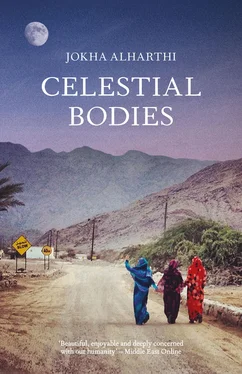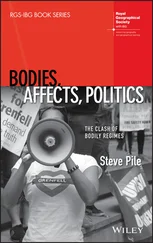Her heart was vacant enough, so why would it not open up for Khalid? She did confess to herself that she’d noticed Marwan, the cousin of her sister Mayya’s husband. She had seen him on a few occasions, and each time, she was taken with the sense of tranquil purity that this figure in white radiated, a silhouette who hardly spoke a word. In fact it was his mysteriousness that ignited her dreams. She was aware that her glimpses of him had been few. Anyway, on the last feast day when he had come to pay his respects to the family, she’d been a bit frightened by the expression in his eyes. She didn’t understand her feelings but she knew his gaze scared her. There was something odd beneath the surface of his silence. She stopped thinking about him.
Khalid... Khalid, the horse artist. He was certainly someone out of the ordinary, as she had fancied. His father, Issa, had acquired his nickname of ‘Emigrant’ by leaving Oman for Egypt in 1959 after the defeat of Imam Ghalib al-Hina’i in the war of the Jabal al-Akhdar. Like nearly two thousand other Omani families who fled, fearing the English and their ruthless manipulations of power, Issa hoisted the burden of his little family onto his shoulders and settled them and himself in Cairo. His sons Khalid and Ali finished their educations there, and his daughter Ghaliya was born there. When Oman’s new government offered an amnesty in the 1970s, asking the fugitives to return and share in constructing a new awakening for a united Oman, Issa the Emigrant refused the offer outright, his head high in exile.
But when Ghaliya grew sick, and then when she died, her mother insisted that they must bury her in her ancestral town. Khalid had just graduated from the Fine Arts Academy so he returned with his parents to the place he had left as a boy. Ali stayed in Cairo to finish his degree and to see out some family obligations. Then he too returned to a town he barely remembered from childhood. Now here they were seeking marriages with hometown girls, these sisters, Asma and Khawla.
A long genealogy connected the two families but what mattered were the few holiday encounters. Asma and Khalid had spoken occasionally. Once she even saw his paintings, on the one family visit to their home that her mother allowed her to join. She was astonished to see such an overwhelming number of paintings all on the same theme, all of the same image. Horses.
Ali’s paintings were precise and detailed, capturing every nuance of a horse’s build. His steeds barely skimmed the ground, as if they were taking off in flight. Studying these horse-forms, Asma was increasingly certain that the paintings contained within them some kind of disquiet. The images made her anxious; she wished these horse-figures were more firmly planted on the ground. No wonder, years later, she felt drawn to paintings of barefoot women with sturdy legs and feet, images that redressed the unease that had collected inside of her as she gazed at the horses — so light, fragile, transitory — in her husband’s paintings. Solid chunky bare legs; she found them reassuring.
Issa the Emigrant was straightforward with her father. We want Asma and Khawla for Khalid and Ali. They’ll live with us in Muscat. Anyone who has lived for a long period in a city like Cairo can’t endure life in a tiny backwater like al-Awafi.
For Asma, moving to Muscat meant she could continue her studies and get a degree. She would enrol in one of the city’s secondary schools and maybe after that she could even get admitted to the university that people said was under construction, or one of the colleges that already existed. She could go on learning. She recalled her mother’s story about her grandfather Shaykh Masoud, the one with the library. A smart, quick boy with a love of knowledge, he wanted to go to the Saidiyya School in Muscat. But his father decided that life in Muscat posed too much of a danger for a future head of the tribe. So the boy learned what he learned from shaykhs and imams in mosques, moving between the centres of learning that existed then in Nazwa and al-Rustaq, though he never forgot his dream of going to modern schools. Later on, he worked with some others on founding a modern school. They wanted to locate it in an open city on the coast, and they chose Sur. After a flurry of planning they laid the foundations but then orders were issued from on high: they were to do no more. In the 1940s the mere idea of educating Omanis terrified the rulers. Masoud and his friends learned of one senior bureaucrat’s reaction, expressed in an exchange with an English confidante, which said it all: Are we going to educate Omanis like you educated the Indians, and so they revolted against you, and soon they’ll oust you entirely?
So the school project in Sur came to an early and rapid close. Masoud returned to his books, procured from India, Egypt and the Arab capitals at the eastern end of the Mediterranean. Salima, telling Asma about her grandfather, didn’t really know how to explain her father’s determination when it came to studies. But Asma thought she knew what he must have felt. She said quietly to her mother: The longing to know things consumes people sometimes. It was a desire that consumed her as it had her grandfather, despite the many years that separated them.
When the truck took Asma’s wedding things away her mother collapsed, alone in the big front room. She felt pangs of hunger, that most familiar of sensations from her childhood, all the time she was growing older, crouched at the foot of the kitchen wall in her uncle’s fortress-like compound, denied the bounties of its kitchen. True, she had not spent her childhood stirring big pots or sweeping or carrying water or wood on her head. True, she was not a slave or a servant. But nor had she ever had the satisfaction of a full stomach or the pleasures of wearing pretty clothes or learning embroidery, since Shaykh Said was not her father but only her father’s brother. She couldn’t leave the confines of the walled compound or play with the girls who lived nearby. She didn’t have a part in the shared laughter and play when women and girls were bathing in the falaj, nor in the dancing at weddings like the girls from slave families did. She couldn’t be given remnants of old clothes out of which she could make gowns for wooden dolls. But equally, she didn’t have gold chains or bracelets to put on, nor could she enjoy the delicacies of the table like the daughters of shaykhs did. She grew up at the foot of the kitchen wall, always hungry, always observing slave women’s freedom to live and dance, and mistress women’s freedom to command others, adorn themselves as they liked, and make visits to their likes in other well-off families.
She could certainly remember the visits her mother made to her and Muaadh, every one surreptitious, their mama cowed. When Mama came to see them her eyes were always puffy. She held them and mumbled words they couldn’t really hear. They knew how she begged Shaykh Said time after time to let them live with her, in her brother’s home. But he always said the same thing. He would not abandon his brother’s children, allowing them to be raised by virtual strangers, outsiders to their father’s big and important family.
Salima particularly remembered a visit when she had just turned ten years old. Instead of sitting with her in the courtyard, half-hidden under the kitchen wall, her mother led her to a room inside her uncle’s forbidding home. She unrolled her head wrap which had been knotted into a bundle. Undoing the knot she took out several pairs of silver earrings and a needle. She smiled at her daughter, telling her that after a lot of difficulty and toil she’d come up with the money to buy these earrings, just for her. From this day on, declared her mother, Salima would be every bit as grand as her uncle’s daughters. Pulling Salima onto her lap, she poked the needle into a pounded clove of garlic to purify it and then plunged it repeatedly into Salima’s ear, making at least ten holes from the top of her ear lobe all the way down. The little girl’s tears soaked her mother’s lap as she submitted herself to the pain. Her mother strung black threads through every hole. Two days later, after the swelling had gone down, her mother came back. She took out the threads and put in the silver earrings, a set of graduated rings, increasing in size and heaviness the lower they were on her ear. Her mother was very proud, and Salima could see that. She endured the terrible pains that wearing these heavy earrings caused. Her ears swelled and festered to the point that she couldn’t sleep on her side, not on either side. She spent countless nights awake, trying to fall asleep on her stomach with her chin against the hard floor. By the time she felt better, some weeks later, and got used to the heaviness of the silver earrings, she’d come to hate any sort of jewellery, indeed any and all of the ways women prettied themselves up.
Читать дальше












